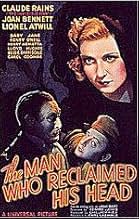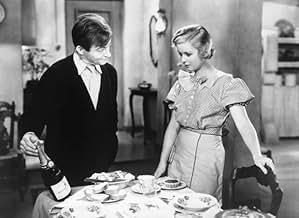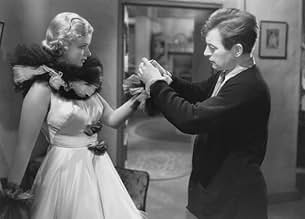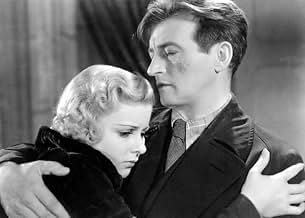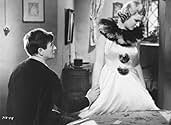A brilliant but impoverished writer, who is a pacifist, goes to work for a publisher and writes anti-war editorials. When he discovers that the publisher has betrayed him and is in league wi... Read allA brilliant but impoverished writer, who is a pacifist, goes to work for a publisher and writes anti-war editorials. When he discovers that the publisher has betrayed him and is in league with munitions manufacturers to make money off of war, he goes insane.A brilliant but impoverished writer, who is a pacifist, goes to work for a publisher and writes anti-war editorials. When he discovers that the publisher has betrayed him and is in league with munitions manufacturers to make money off of war, he goes insane.
Juanita Quigley
- Linette Verin
- (as Baby Jane)
William B. Davidson
- Charles
- (as William Davidson)
Judith Wood
- Margot
- (scenes deleted)
Norman Ainsley
- Steward
- (uncredited)
Bessie Barriscale
- Louise, the Maid
- (uncredited)
Ted Billings
- Newsboy
- (uncredited)
Phyllis Brooks
- Secretary
- (uncredited)
Rudolph Cameron
- Maitre D'Hotel
- (uncredited)
Russ Clark
- French Truck Driver
- (uncredited)
Carol Coombe
- Clerk
- (uncredited)
Harry Cording
- French Mechanic
- (uncredited)
Featured reviews
1934's "The Man Who Reclaimed His Head" marked Claude Rains' return to Universal after the huge success of "The Invisible Man," only here he's cast as Paul Verin, meek, mild mannered writer, an impassioned pacifist who accepts a generous offer from his unscrupulous former employer, Henri Dumont (Lionel Atwill), who seeks to gain fame and fortune by putting his own name on Verin's articles (a flashback set just prior to the outbreak of WW1). An unsuccessful 1932 stage play that had also starred Rains (closing after 28 performances), this adaptation shows its talky origins only too well, frequently dragging in spots, while its 1945 remake, "Strange Confession," with Lon Chaney in the lead and J. Carrol Naish in the Atwill role, was effectively streamlined and updated into a far more compact 62 minutes, eliminating the entire anti-war backstory. The fetching Joan Bennett, still a blonde, plays Verin's wife Adele, whose ambitious prodding nearly gets her husband killed, while both Atwill and Wallace Ford fail to conceal their lust for her (we must regard her unfavorably after she fails to chastise Atwill for kissing her). Cast as daughter Linette is the atrocious train wreck called 'Baby Jane,' who must have greatly improved if she continued to work under the name Juanita Quigley (that's what happened to Baby Jane!). Several Universal veterans in smaller roles include Lawrence Grant ("Son of Frankenstein"), Doris Lloyd, Henry Armetta ("The Black Cat"), even Edward Van Sloan. Look fast for breathtaking newcomer Valerie Hobson, unbilled 17 minutes in, standing next to the partying Wallace Ford, who'd rather play with Joan Bennett. Unlike "The Invisible Man" and "Mystery of Edwin Drood," "The Man Who Reclaimed His Head" was never part of Universal's popular SHOCK! television package of the late 50s; yet because of its false marketing as a shocker, it did make a whopping four appearances on Pittsburgh's Chiller Theater- Mar 16 1974 (following 1967's "The Bamboo Saucer"), Sept 18 1976 (following 1937's "Night Key"), Aug 13 1977 (following 1943's "The Mummy's Ghost"), and Mar 26 1983 (solo).
Claude Rains has already given such kind of characters of anti heroes, as the ones he showed in PHANTOM OF THE OPERA, or THE INVISIBLE MAN. Lon Chaney was also used to play such characters fighting against something which was about to destroy them, fights lost in advance. Universal Pictures seemed not being reluctant about those anti Hollywood schemes. Rains was the perfect portrait of the poor hero whom any audience could not ignore, nor feel empathy for. This was an early Edward Ludwig film, surprising and interesting as well for this director who will later become an adventure yarn specialist: WAKE OF THE RED WITCH, SMUGGLER'S ISLAND, JIVARO, FLAME OF THE ISLANDS, CARIBBEAN...But please don't miss this movie for Claude Rains' performance.
War is a matter many people take very seriously; whether they're hawks or doves. Unfortunately, some people profit from war, which means that they take making money very seriously; such that they would profit off of death and destruction.
Paul Verin (Claude Rains) was serious about peace. He was dead set against war as he saw it as a tool for certain people to gain money and power. He was a columnist who was well versed in putting his ideas eloquently onto paper. A man named Henry Dumont (Lionel Atwill) wanted to use Paul's abilities for his own newspaper. He claimed that Paul could work at the newspaper on his own terms. Paul refused because he knew it would only be a matter of time before he'd have to cave to the agenda of the newspaper (aka Henry Dumont) and thereby sellout.
Paul's wife, Adele (Joan Bennett), wanted him to take the position so that they could have some financial freedom. Having freedom of thought was fine, but how could that provide nice clothes and a warm bed? So, because of Paul's deep love for his wife, he accepted the position and moved his family to Paris.
The movie began in 1915 with France in the grips of a war. Paul was wearing a soldier's uniform and he was seeking the help of an attorney. He decided to tell the attorney the long version of his predicament, which is how we got his backstory.
"The Man Who Reclaimed His Head" was a deep movie. It was similar to "Men Must Fight" (1932) without the oversimplification of war. Paul was convincing as an intellectual who was satisfied with little more than his ideals and his wife. Such people always have to figure out how to navigate a world dominated by unscrupulous men of wealth. Ideals only take a man so far, and sometimes just a small bit of compromise could lead a person down a slippery slope of shedding their entire identity. Paul didn't want to be that man.
I like "The Man Who Reclaimed His Head." It was a relevant movie for any era. There will always be war and there will always be Paul Verins and Henry Dumonts.
Free on Odnoklassniki.
Paul Verin (Claude Rains) was serious about peace. He was dead set against war as he saw it as a tool for certain people to gain money and power. He was a columnist who was well versed in putting his ideas eloquently onto paper. A man named Henry Dumont (Lionel Atwill) wanted to use Paul's abilities for his own newspaper. He claimed that Paul could work at the newspaper on his own terms. Paul refused because he knew it would only be a matter of time before he'd have to cave to the agenda of the newspaper (aka Henry Dumont) and thereby sellout.
Paul's wife, Adele (Joan Bennett), wanted him to take the position so that they could have some financial freedom. Having freedom of thought was fine, but how could that provide nice clothes and a warm bed? So, because of Paul's deep love for his wife, he accepted the position and moved his family to Paris.
The movie began in 1915 with France in the grips of a war. Paul was wearing a soldier's uniform and he was seeking the help of an attorney. He decided to tell the attorney the long version of his predicament, which is how we got his backstory.
"The Man Who Reclaimed His Head" was a deep movie. It was similar to "Men Must Fight" (1932) without the oversimplification of war. Paul was convincing as an intellectual who was satisfied with little more than his ideals and his wife. Such people always have to figure out how to navigate a world dominated by unscrupulous men of wealth. Ideals only take a man so far, and sometimes just a small bit of compromise could lead a person down a slippery slope of shedding their entire identity. Paul didn't want to be that man.
I like "The Man Who Reclaimed His Head." It was a relevant movie for any era. There will always be war and there will always be Paul Verins and Henry Dumonts.
Free on Odnoklassniki.
This is an extraordinarily well filmed and written movie. And it'd have a hard time getting produced and distributed today. The Claude Raines character finds his Leftish anti-war writings used by war makers to promote World War I. His efforts to set things right are portrayed as ruthlessly blocked by elements the film portrays as both pushing the war in their own interests and essentially running the government: a ruling class consisting of the corporate elite in the form of munitions-manufacturing interests.
This is quite a political film, dark, tense and tragic. A neglected masterpiece.
This is quite a political film, dark, tense and tragic. A neglected masterpiece.
I caught this on TV late one night. From the cheesy title, I expected a horrible *B* film. I've always been a fan of Claude...so I had to watch. Surprise, surprise, this movie is GREAT! It may have been a B film, but it has stayed with me for 30 years. Even though no one has ever heard of it, I recommend it often. As someone else remarked, it isn't a horror movie in the traditional sense. But the horrors of war is the subject. There was not a moment wasted in the direction. The opening shot pulls you right in. You can't believe your eyes. And then a flashback to an idyllic setting. But soon the war has turned our hero's life in pure Hell. The tale is about war profiteering. Strangely appropriate in 2006. Can you say Halliburton? The film brings you round to the opening scene again in a fantastic ending also. And the final words are exactly the opposite of what you expected in the opening scenes. Find & watch it!
Did you know
- TriviaFinal film of Bessie Barriscale.
- ConnectionsFeatured in Son of Svengoolie: The Man Who Reclaimed His Head (1982)
Details
- Runtime1 hour 20 minutes
- Color
- Aspect ratio
- 1.37 : 1
Contribute to this page
Suggest an edit or add missing content


